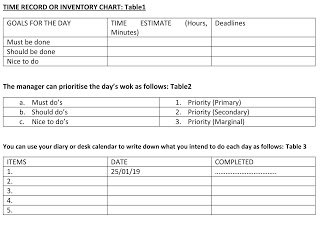What is time?
A simple dictionary defines time as “intervals of seconds, minutes, hours, days, weeks, months or years needed to go something”.
The importance of time
The following sayings have been used since time immemorial to stress the importance of time: Time and tide wait for no man, time is money and procrastination is the thief of time.
The Old Testament Book of Esther reads about a king who communicated with time-conscious wise mean (Esther 1 verse 13).
Many people have succeeded in life because they have been able to use time wisely. God has given every person 24 hours each day and successful people have managed those hours effectively. An effective worker or supervisor has been distinguished by the way he/she manages time.
Time provides equal opportunities to all people. Each human being has exactly the same number of hours and minutes every day. Rich people cannot buy more hours. Scientists have not been able to invent more time. A person cannot save time in order to spend it on another day. Time is so amazingly fair and forgiving no matter how much time you have wasted in the past; you still have an entire tomorrow. Success depends on using it wisely by planning and setting priorities. The fact is that time is worth more than money. If we waste time we will minimise our chances for success in life.
Time as a key resource
Time is one of the following resources that an organisation needs in order to carry out its mission and achieve its strategic objectives.
a) Manpower
b) Money
c) Materials
d) Minutes (time)
e) Meters (Space – physical facilities)
f) Methods
The competent use of resource enables an organisation to succeed.
As a critical natural resource, time is:
• Scarce
• Unique
• Inelastic
• Priceless
• Perishable and cannot be stored
• In short supply
• Irreplaceable (you cannot substitute time)
• Everything requires time
• The only truly universal condition
2. How to effectively manage time
a) Determine what you want from your time.
Plan for each working day and diarise each activity. That is the reason why each manager is provided with a diary or desk diary by the organisation. More often than not, we find managers writing their grocery list or personal issues than work-related issues. Diaries and desk calendars must be used for planning one’s work.
b) Determine answers for the following questions
• What do you want to achieve?
• What is a reasonable expectation for the day?
• How can I best use the eight hours I am at a station?
Spend the first 15 minutes of each working day determining what you expect to achieve.
c) Determine how you currently use time. Before you can determine on how time is being used, a time record or a time inventory chart can be prepared on a daily or weekly basis.
TIME RECORD OR INVENTORY CHART: see chart 1
On analysis of the chart, the manager will be able to answer the following questions
• How is the majority of time spent?
• Is the entire work day productive?
• Are some portions of the working days more productive than others?
• Is the time being effectively used?
The manager can prioritise the day’s wok as follows: See chart 2
N.B. You must complete the must do’s in the morning.
SET PRIORITIES
• Identify the must do’s.
• Prioritise the must do’s in rank order.
• Do not neglect more important tasks in favour of less important ones.
• Enter priorities on a daily list to avoid confusion.
You can use your diary or desk calendar to write down what you intend to do each day as follows: See chart 3
DELEGATION
• Supervisors must learn to delegate.
• Push subordinates for work that they can do just well or better.
• Supervisors who try to do everything run the risk of stress or burning out.
• Delegation is also a sensible technique of developing subordinates.
• It is critical for achieving organisational goals.
• Demand finished work.
DO ONE THING AT A TIME
• You can produce good results by concentrating on one thing at a time.
3. TIME SAVING TECHNIQUES
• Time saving techniques can help to Improve productivity
• You should avoid “clutter”; some desks look like disaster areas with piles of paper scattered in around. With clutter on the desk, a manager will not be able to see the client.
• Enormous amounts of time are wasted looking for papers that are at the bottom of the clutter.
PROCRASTINATION
• Procrastination is the thief of time. One should not wait for tomorrow to do what he or she can do on that day.
• Do not avoid “must do’s” in favour of interesting NICE TO DO’S.
HOW TO STOP PROCRASTINATION
• Prepare a list of things that you have been avoiding.
• Prioritise them and establish realistic deadlines for their completion
• Begin by tackling the most important tasks.
• Do not be afraid of failing.
• Eliminate statements such as “I can’t” and start thinking in terms of “I will”.
Time-wasting activities are like tumours; they drain vitality and have a tendency to grow. The only cure is to remove then.
TIME SAVERS
The manager can save time by:
• Setting targets (time/amount) for each task.
• Delegating effectively.
• Avoiding attending unnecessary meetings.
• Structuring meetings carefully.
• Working from the top (high priority tasks first).
• Avoiding self-interruptions.
• Being available at specified times.
• Reviewing days’ performances before going home.
• Being assertive. Ability to say “NO”.
• Attacking unpleasant tasks first.
• Planning phone calls before making them.
• Doing high priority tasks during peak performances time.
• Planning a “THINK” (forward planning) time each day.
• Concentrating on one thing at a time.
• Setting deadline for important activities; both urgent and unpleasant tasks that have to be done.
CONCLUSION
Time is the scarcest resources. Unless it is properly managed, nothing will be successful. The analysis of one’s time is a systematic way of analysing one’s work and thinking about what really matters in it.
The writer is a retired educationist who served in the Ministry of Education for over 40 years. He was a teacher (1966-1974), school head at Nhamwi St Stanislaus School (1975-1984), DEO Chivi North (1985-1987), Chivi District Staffing Officer (1987-1993), Zaka Education Officer (1993-1996), Chivi Education Officer (1996-1999), Gutu DEO (1999-2008) and Reformed Church in Zimbabwe (RCZ) Education Secretary (2008-2015).
The writer can be Contacted on 0784 949 878


